Unearth the riveting tales of Apostle Paul's journeys in Philippi in the Bible Map.
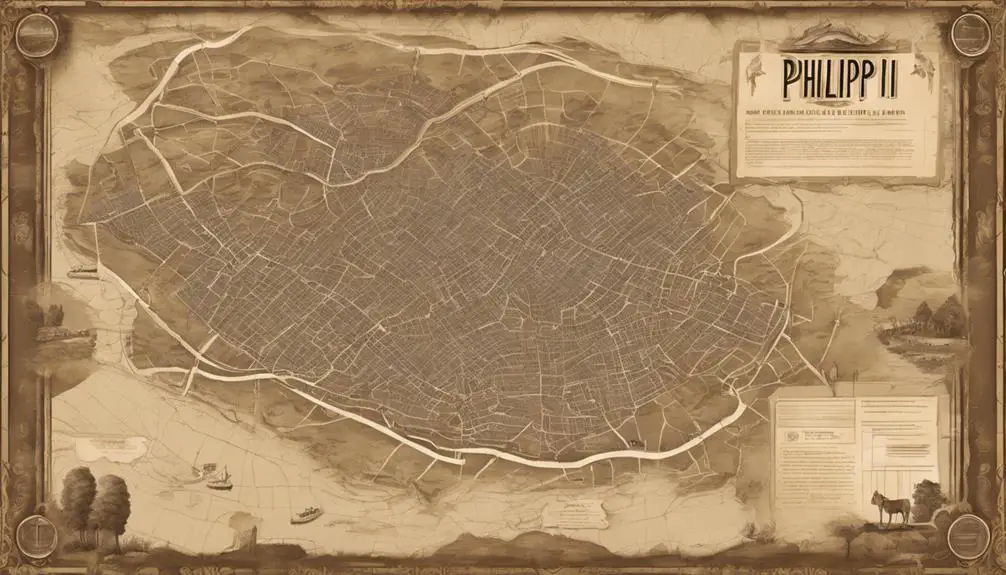
Philippi in the Bible Map
Did you know that Philippi, mentioned in the Bible, was the first European city to hear the Christian Gospel according to Acts 16? As you trace the footsteps of the Apostle Paul on the Bible map, you'll see Philippi plays a significant role in early Christianity.
But what are the specific events that occurred here? Why was this city so important in Paul's journeys? Hang tight, as we're about to explore the intriguing stories behind Philippi's biblical significance.
Key Takeaways
- Philippi's strategic location on the Via Egnatia made it a significant junction for trade, culture, and early Christian missions.
- The Apostle Paul established the first European Christian community in Philippi, marking a pivotal point in Christian history.
- Archaeological discoveries such as the Roman forum and city walls provide insights into Philippi's historical and biblical significance.
- Surrounded by fertile plains and mountains, Philippi's geographical features contributed to its narrative in the Bible.
Historical Significance of Philippi
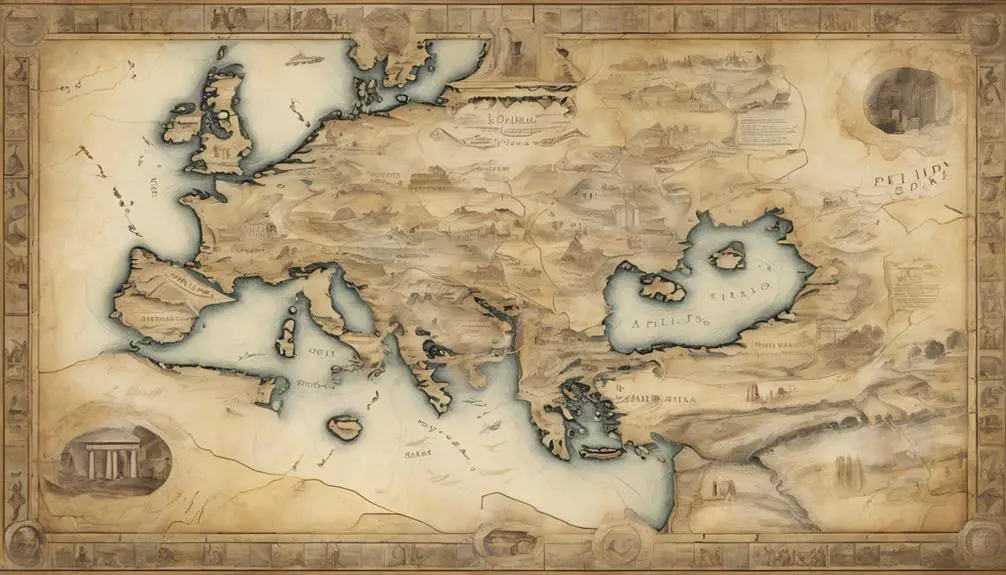
To truly grasp the historical significance of Philippi, you need to delve into its rich past, as it holds a pivotal place in the events of the New Testament, shaping many narratives within the Bible. Your exploration will reveal the grandeur of the Roman influence in Philippi, which was more than just a cultural imposition. It was a political strategy that transformed the city into a miniaturized Rome, complete with a forum, theatre, and a system of laws mimicking those of the Roman empire.
Philippi's economic significance wasn't to be overlooked either. It was strategically situated near gold and silver mines, making it a prosperous commercial hub. The Via Egnatia, a principal Roman road, ran through Philippi, connecting it to other key cities. Consequently, Philippi became a gateway for trade, ideas, and influencers.
The Apostle Paul's Journey to Philippi
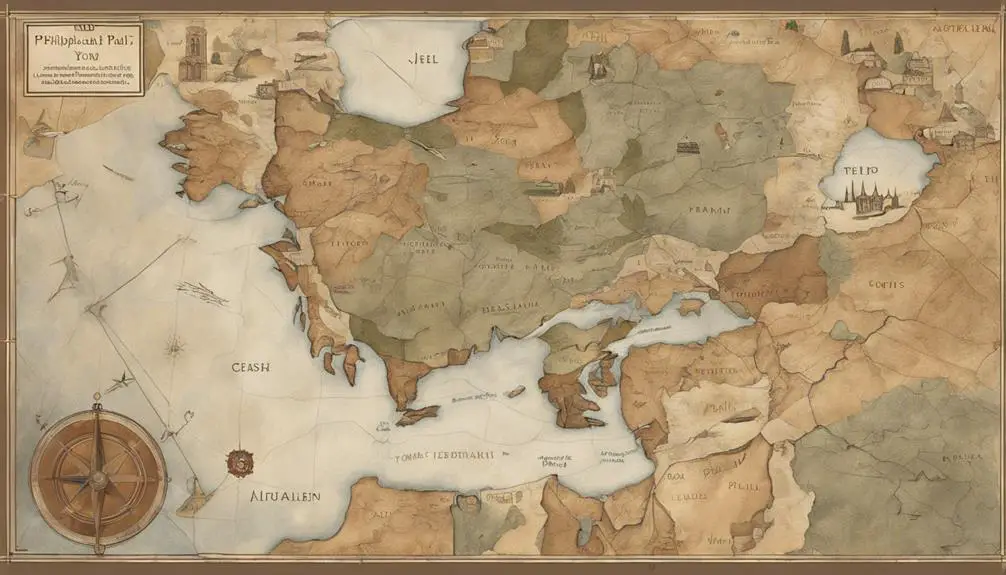
Building on this historical context, you'll find it intriguing to trace the Apostle Paul's journey to Philippi, a voyage that significantly impacted early Christianity. After Paul's conversion on the road to Damascus, his life took a dramatic turn. His newfound faith led him to Philippi, a vital city that was a hub for Roman influence.
Paul's journey to Philippi, as described in the Bible's book of Acts, reveals a strategic intent. He recognized Philippi's geopolitical importance under Roman rule and saw an opportunity to spread Christianity. You can imagine him walking the city's Roman roads, speaking with its diverse population about his transformation and the teachings of Jesus.
His arrival in Philippi marked a pivotal point in Christian history. It was here that Paul established the first European Christian community, dramatically expanding the faith beyond its origins in the Middle East. His letters to the Philippians, filled with guidance and encouragement, are a testament to the deep spiritual bond he forged with this community. They also illustrate the far-reaching effects of Roman influence on early Christianity.
Archaeological Discoveries in Philippi
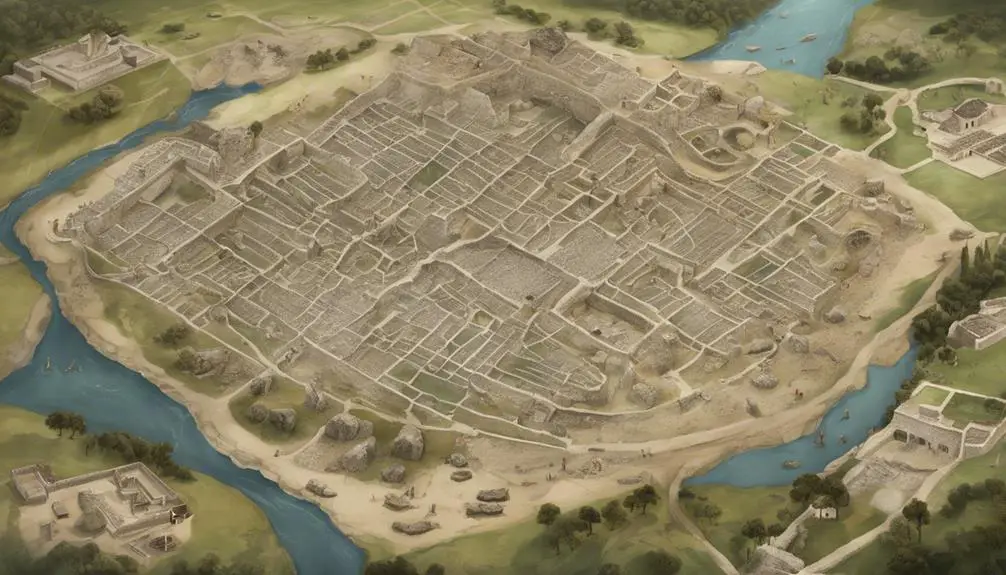
Unearthing centuries-old relics, archaeologists have made significant discoveries in Philippi that shed light on the city's rich cultural and religious history. You can see the Roman influence in Philippi through the remnants of the ancient city, including the Roman forum, the theatre, and the city walls.
The Roman forum, located at the heart of Philippi, once served as a bustling market place and a vital center for political activities. Today, it stands as a testament to the advanced engineering capabilities of the Romans and their impact on the city's architecture. The theatre, another significant find, is a clear reflection of Roman influence. Its well-preserved structure lends insight into the socio-cultural aspects of Roman-ruled Philippi, such as public entertainment and ceremonies.
Philippi's ancient ruins also include the city walls. These formidable structures, though partially ruined, still evoke the might of the once-powerful city. The walls weren't only for defense but also a symbol of power and prestige.
These archaeological discoveries provide a tangible link to Philippi's past, allowing you to better understand the city's rich cultural and historical context. They underscore the significant Roman influence in Philippi, which is a crucial part of its multifaceted identity.
Philippi's Role in Early Christianity
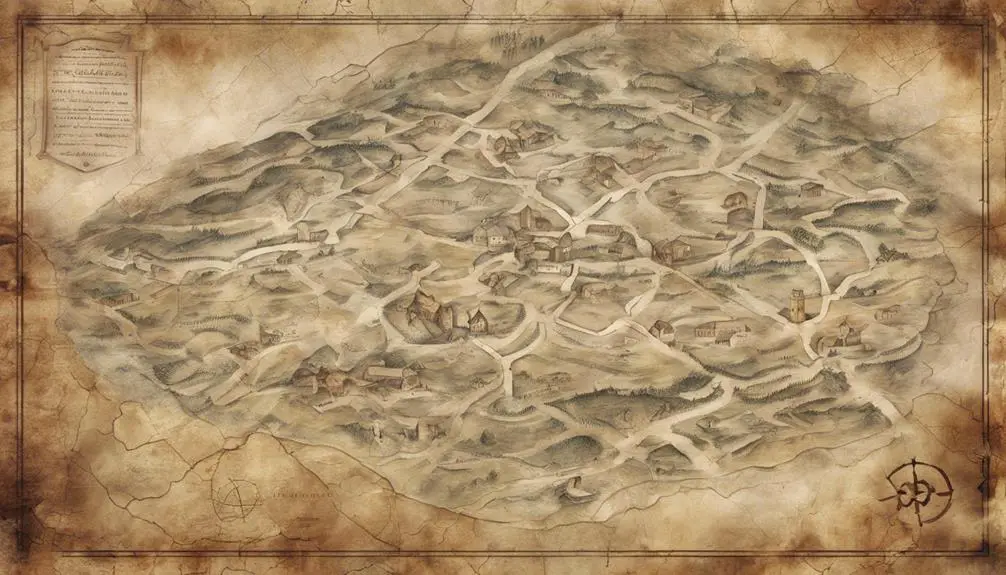
Delving into the realm of early Christianity, you'll find that Philippi played a pivotal role, providing a significant backdrop to many key events and figures in biblical history. As a city under Roman control, Philippi's governance was heavily influenced by the Roman Empire, which directly impacted the Christian Community Evolution.
In Philippi, the first European Christian community was established, a significant milestone in the spread of Christianity. This was largely due to the strategic location of the city and the freedom of worship permitted under Roman rule. The Apostle Paul made his first European convert in Philippi, a woman named Lydia, marking a key event in early Christianity.
However, the city wasn't without its share of conflict. Paul and Silas were imprisoned in Philippi, a move that stirred tension within the Christian community. Despite this, the resilient Christian community in Philippi thrived, ultimately contributing to the growth of Christianity in Europe.
You'll find that the evolution of the Christian community in Philippi was no mere happenstance. Philippi's governance, its strategic location, and the steadfastness of its early Christian community all played significant roles in shaping the course of early Christianity.
Mapping Philippi's Biblical Locations
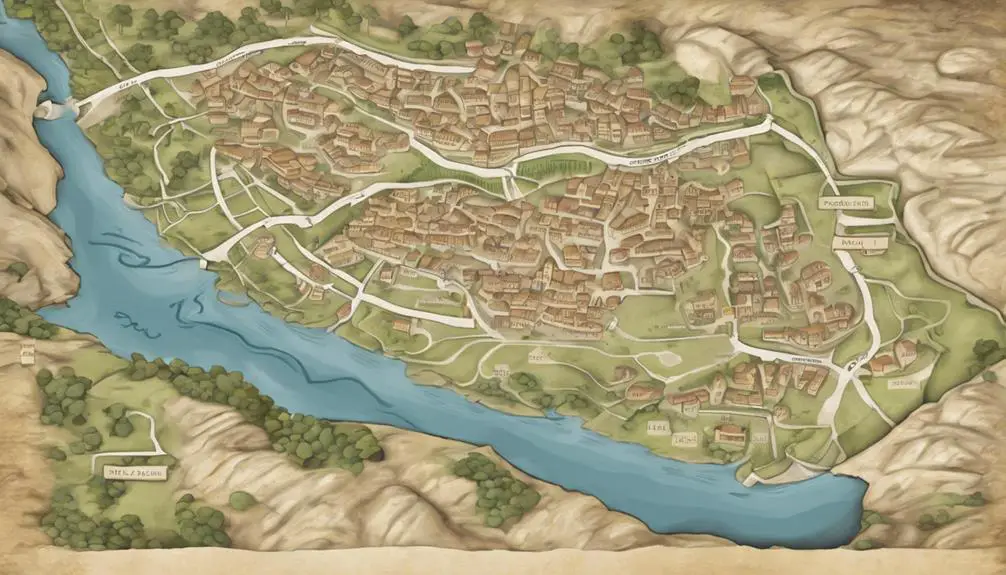
Ever wondered how the biblical locations in Philippi line up on a map? Understanding Philippi's geography is key to mapping these significant places. Situated in Eastern Macedonia, Philippi is nestled near the northern coast of the Aegean Sea. It's marked by fertile plains to the south, and formidable mountains to the north—these geographical features played a vital role in the city's biblical narrative.
Philippi's location on the Via Egnatia, a crucial east-west trade route, heavily influenced its development and significance. This trade route shaped the city's cultural and economic landscape, and impacted its role in biblical events. Many biblical locations in Philippi sprung up along this route, like the riverside where Lydia, the first European convert, was baptized.
You'll notice that the city's strategic location, influenced by trade routes, made it a hub for travelers, traders, and missionaries alike. This blend of cultures and ideas contributed to Philippi's prominence in the New Testament. So, when you're looking at Philippi on a Bible map, remember the influence of its geography and trade routes—it's more than just a point on a map, it's a vibrant, historical crossroads.
Notable Biblical Events in Philippi
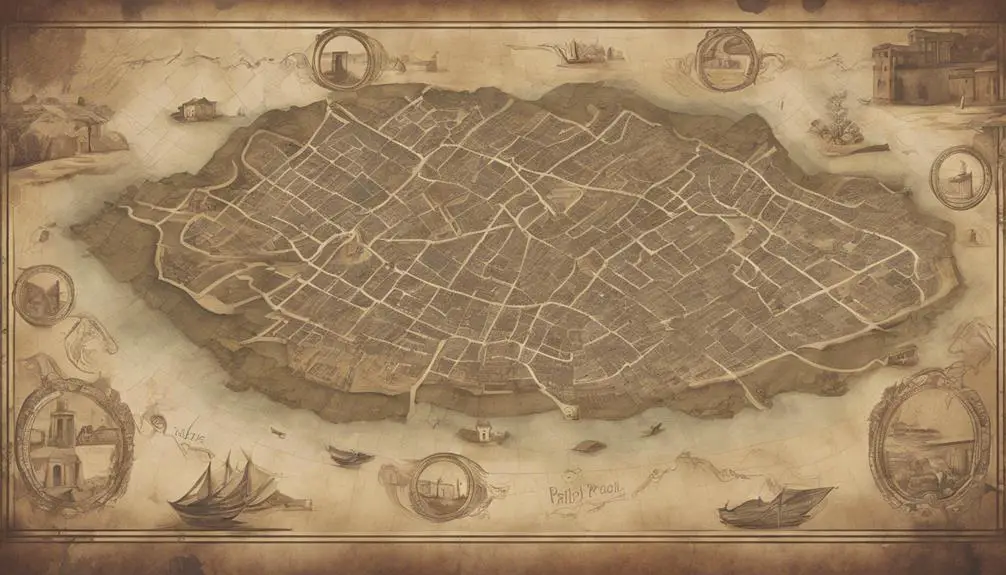
Building on this understanding of Philippi's geography and trade influence, let's explore some of the notable biblical events that unfolded in this bustling city. Two significant events you'll find fascinating are the Philippian Jailbreak and Lydia's Conversion.
The Philippian Jailbreak, as told in Acts 16, was a miraculous event. Paul and Silas, unjustly imprisoned for their faith, prayed and sang hymns. Suddenly, a violent earthquake shook the prison, throwing open the doors. Despite the opportunity to escape, they remained, leading to the jailer's conversion. This event reveals the power of faith and God's intervention, even in dire situations.
Equally remarkable is Lydia's Conversion. Lydia, a wealthy merchant dealing in purple dye, heard Paul's preaching. Her heart was 'opened' to understand and accept his message, leading to her and her household's baptism. This event, also recorded in Acts 16, reinforces the role of Philippi as a crucial Christian center.
These events exemplify the city's significance in spreading Christianity. Philippi, being a strategic location, served as a backdrop for these transformative episodes, thus earning its place in biblical history. Understanding these events helps you appreciate Philippi's biblical prominence and its influence on Christian faith.
Frequently Asked Questions
What Are the Primary Languages Spoken in Philippi During the Biblical Times?
You're curious about the languages spoken in Philippi during biblical times.
Predominantly, Greek and Latin were the primary languages due to their influence on Philippi's religion and societal roles. Greek was the lingua franca, used widely in commerce and literature. Latin, meanwhile, reflected the Roman presence and governance.
Both languages deeply impacted Philippi's society, shaping its culture, religion, and daily interactions. Understanding this language dynamic gives us insight into biblical Philippi.
How Did the Geographical Features of Philippi Influence Its Significance in the Bible?
Philippi's geographical features greatly impacted its biblical significance. Its location along key trade routes facilitated cultural exchanges and spread of Christianity. Additionally, Philippi's thriving mining industry contributed to its wealth and importance.
These factors combined to make Philippi a significant city in the Bible, where Paul established a church and penned the book of Philippians. So, you see, geography played a pivotal role in shaping Philippi's biblical narrative.
What Is the Current State of Philippi Today and Is It Still Inhabited?
Today, you'd find Philippi as a fascinating archaeological site, no longer inhabited. Philippi's economy, once booming due to the Roman influence, is now sustained by tourism.
You'd see remnants of Roman architecture, a testament to its historical significance. Despite the absence of residents, its past resonates with each stone, echoing its biblical importance.
Visiting it's like stepping back in time, a reminder of its once vital role in biblical history.
Are There Any Significant Biblical Artifacts From Philippi That Are Preserved in Museums Today?
Yes, there are significant biblical artifacts from Philippi preserved today. You'd find Philippi's Archaeology Discoveries in various museums worldwide. These items reflect the Biblical Significance of Philippi Artifacts, providing tangible links to stories and events from the Bible.
They're not just historical pieces, they're physical embodiments of faith and tradition. It's fascinating how these objects continue to shed light on biblical narratives even centuries after their creation.
What Are Some Cultural Practices or Traditions Unique to the People of Philippi During Biblical Times?
You're curious about the cultural practices of Philippi during biblical times.
The Philippi economy was heavily influenced by its rich gold mines.
As for traditions, they held ancient festivals honoring Greek gods like Dionysus. People participated in elaborate processions, theatrical performances, and feasts.
However, remember these practices significantly changed after Apostle Paul's visit, as Christianity began to take root.
Both these economic and religious aspects shaped Philippi's unique cultural identity.
Conclusion
You've traced Philippi's biblical footsteps and explored its historical significance, Paul's journey, and archaeological discoveries. You've seen how vital Philippi was in early Christianity and navigated its biblical map.
Ponder the notable events that unfolded here. Remember, Philippi isn't just a dot on a map; it's a testament to the enduring power of faith and the spread of Christianity.



Sign up